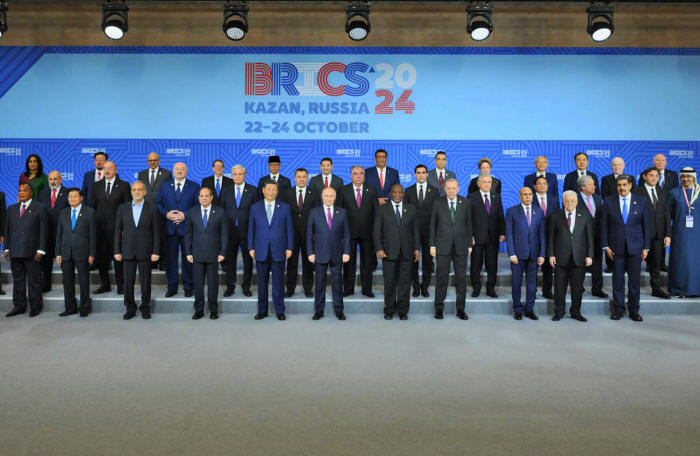|

by Dennis Small
October 24, 2024
from
EIR Website

Chinese President Xi Jinping, center left,
Russian President
Vladimir Putin,
and South African President Cyril Ramaphosa, center
right,
posing for a joint photo of the BRICS leaders
during the 16th BRICS summit in Kazan.
Credit: Author: Sergey Bobylev
ource:
Photohost agency brics-russia2024.ru
The 16th BRICS Summit drew to a close today in
Kazan, Russia, with
the announcement that the nine current members of the BRICS had
agreed to invite 13 countries to join as new "partner
states" - representing nearly 1 billion human beings!
The BRICS
grouping now represents over 4.6 billion people - 57% of the world's
population...:
the Global Majority, to be sure...
More important than the numbers as such,
are the policies and
principles to which they are committed...
China's President
Xi Jinping, in his Oct. 23 address to the opening
session of the summit, called on the BRICS to help guide the world
along,
"the overarching trend of peace and development."
Xi asked his
fellow leaders:
"Should we allow the world to descend into the abyss
of disorder and chaos, or should we strive to steer it back on the
path of peace and development?"
He answered that the BRICS shared,
an "unwavering determination" and "willpower" to build
"a shared future for mankind."
Speaking just before President Xi,
Russian President
Vladimir Putin
had stated:
"We have assumed responsibility for the future of the
world, not only in word, but in deed."
Putin later told the
BRICS
Plus/Outreach session:
"All our countries share similar aspirations,
values and a vision of a new democratic world order that reflects
cultural and civilizational diversity.
We are confident that such a system should be
guided by the universal principles of respect for the legitimate
interests and sovereign choice of nations, respect for
international law and a spirit of mutually beneficial, honest
co-operation."
Putin's spokesman Dmitry Peskov elaborated on the BRICS's purpose
and principles, in order to explain why the BRICS is not closed to
any nation, even members of NATO or the EU (the admission of
NATO-member Türkiye as a new BRICS "partner state" served to prove
his point):
"There is a political will that unites
countries that share the same vision of development prospects.
Be it political development, economic
development, cultural development and so on. It is an atmosphere
in which each other's interests are taken into account.
It is an atmosphere where there are no
hegemonic aspirations."
As the BRICS summit drew to a close, the urgent strategic question
lingered in the air:
Will the West now listen to the BRICS,
cooperate with the Global Majority, and stop the drive to nuclear war...?
EIR's correspondents in Kazan posed precisely that question at a
press conference given by Russian Presidential advisor Anton Kobyakov.
"Even if the BRICS is not anti-West, the West is currently
anti-BRICS," EIR's Sébastien Périmony began.
"If this does not
change, we have the risk of nuclear war in the conflicts occurring
in Ukraine and the Middle East, and a perpetuation of sanctions.
Do
you think the BRICS process will change the outlook of the
Anglo-American elites, to participate positively in developing a new
security and development architecture, as called for by Helga
Zepp-LaRouche of the Schiller Institute?"
Kobyakov's response was blunt:
"We hope
the Anglo-American elites
will respond positively.
But we have a doctrine of nuclear
deterrence. When the Pax Americana ends, we hope that the whole
world does not go down with it."
He added, referring to both
Israel
and the
United States:
"Maybe after hearing the speeches during the BRICS
meetings, they will come to their senses. We hope so."
The BRICS summit has now handed us that opportunity.
Our activities
in the United States and
Europe over the next days and weeks will
speak volumes to that decisive, open question...
|


